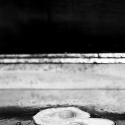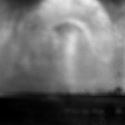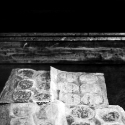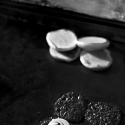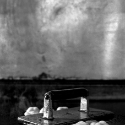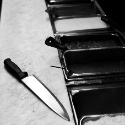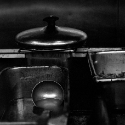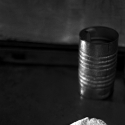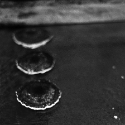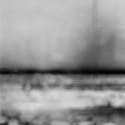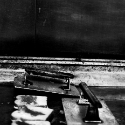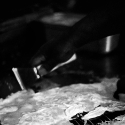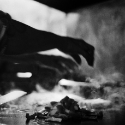This series of black and white photographs began while I was sitting at the counter of the Triangle Cafe in West Oakland watching the cook's repetitious dance along the edge of the grill. I asked if I could photograph her work. She invited me back and I began shuffling alongside her, focusing my camera on the geometric landscape she orchestrated out of eggs, sausages and other breakfast items.
Aporia, the title of this series, is a term used by Socrates in Plato's 'Meno'. It refers to a state of being in which someone is shown they do not know what they thought they knew and in turn they are inspired to seek further knowledge. This work is about seeing our familiar world in unfamiliar ways. The images are as mundane and simple as humorous and beautiful. They are as ominous and dark as absurd and safe. These shifts in perspective underline my interest in the ambiguous, and yet energizing, potential of photography.
Bio
In 7th grade my aunt taught me how to make Van Dyke prints from a pinhole camera. Photography has been a part of my life ever since. My formal studies include sociology and photojournalism from San Francisco State University, Spanish in Guatemala and Chile and documentary photography from the Center for Documentary Studies at Duke University. In 2003-04 I was the recipient of a Lewis Hine Documentary Initiative Fellowship. In January 2010 I began life as an independent photographer and artist after having worked for Hedrich Blessing Photographers.
My work has been exhibited in Santa Fe, North Carolina, Seattle, Chicago and South Africa and currently is represented by Victoria Price Contemporary Art & Design in Santa Fe. It's been included in various publications from The New Yorker to Manoa (a literary journal published by the University of Hawaii) to Hollow City by Rebecca Solnit and Susan Schwartzenberg.
Whether I am photographing residents of an informal settlement in South Africa; the geometry of a short-order cook; or architecture that assumes monumentality amid the march of humanity, I enjoy thinking about two things: Henri Cartier Bresson's observation that "the world is movement and you cannot be stationary in your attitude toward something that is moving" and Loren Eiseley's observation that "nothing is lost but it can never be again as it was."
For more information, please contact Kate Joyce at: kate@kate-joyce.com or visit www.kate-joyce.com

